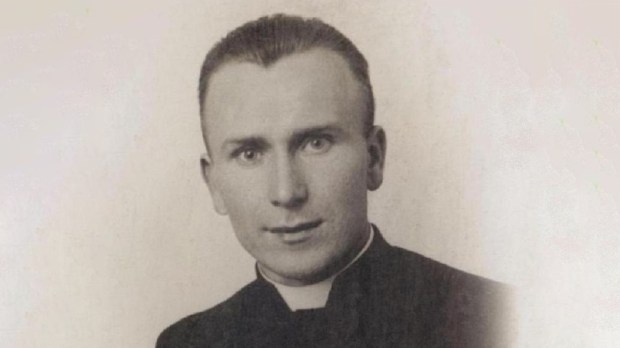Nazis were the most prolific users of the guillotine of all time. The first person guillotined by the Nazis was a Catholic priest.
He was born as Jan Fanciszek Macha (John Francis) on January 18, 1914, in Charzow, Poland, to Powel Macha and Anna Cofalka. He had two sisters, Roze (Rose) and Marie, and a brother, Piotr (Peter). At home, Jan was known as Hanik. Hanik was the oldest of his siblings.
As a youngster, Jan felt the calling to the priesthood, and at the age of 20, he entered the seminary knowing that this calling was the right direction for his life. He wanted to be a shepherd of souls.
On June 25, 1939, he was ordained a priest in the Church of the Holy Apostles of Peter and Paul in Katowice, Poland.
“—know that I will die young.”
Father Jan celebrated his first Mass in his home parish of St. Mary Magdalen in Charzow. Something strange occurred at this time.
Father Jan’s sister, Rosa, comes into the sacristy to see him. He looked at her and said, “Rosa, know that I will die young and not a natural death.” Rosa told him not to talk like that on such a joyful day, but Jan continued. “Rosa, just today, I want to tell you this because I am convinced I will die young.”
When Mass started and the censing began, most of the people in the congregation saw the smoke forming like a “red” scarf around the neck of the new priest. Barely anyone paid attention to it.
Nazis invade Poland
The Nazis invaded Poland at 4:45 a.m. on September 1, 1939. At the same time, Father Jan Macha was beginning his priestly ministry as an assistant pastor in St. Joseph’s parish in Ruda.
Father Jan was fully occupied with his priestly duties, focused on the many souls entrusted to his care, and fully aware of the danger that loomed all around the Polish people.
Father Jan Macha was in a part of Poland that the Nazis were determined to “Germanize.” Included among their “Germanizing” requirements was that the natives speak German. This was required among neighbors, in private homes, and even in church. The German government ordered that even homilies and songs be in German.
Father Jan loved his Polish language and Polish heritage and was deeply offended by this insanity. In addition, it was costly for him to implement these demands. Paying for translations and new songbooks and readers and instruction guides was an impossible demand to fulfill. He was also keenly aware of the poverty of the people in his care. He wanted to do something.
He organized Konvalia (Lily of the Valley)
So he established an organization called “Konvalia” (Lily of the Valley). Its purpose was to help raise money to offset the tremendous expense that had been thrust upon him and his people. The Gestapo immediately arrested him.
On September 5, 1941, Father Jan was taken to prison in Katowice. He was interrogated and beaten over and over. Select types of torture were used to break the young priest. His torturers failed.
The Germans had adopted the guillotine because of its speed and efficiency. Eventually, they would have 40 of them operating in certain parts of the Reich. The first one was located in Katowice.
Sentenced to death
On July 17, 1942, Father Jan Franciscek Macha was sentenced to death. His family began desperately seeking help to save him. His mother traveled to Germany and met with Hitler’s sister, asking for “grace” to spare her boy. She promised to “talk to the Fuhrer” about it. Father Jan’s mom waited every day for a reply. None would ever come.
The first guillotines had been placed in the prison in Katowice. Father Jan was brought to the prison on December 3, 1942. He was informed that he would die that night. He was executed at 11 p.m., at age 28.
In his breviary a note written by Father Jan was found. It reads: “I give myself all to Him with my whole person.”
In his breviary a note written by Father Jan was found. It reads: “I give myself all to Him with my whole person.”
“In odium fidei”
Father Jan Franciscek Macha was declared a Servant of God in 2013. Pope Francis confirmed in 2019 that he died “in odium fidei” (in hatred of the faith). He was beatified on November 20, 2021, in Katowice, Poland by Cardinal Marcello Semeraro.
After leading the midday Angelus on November 21, Pope Francis spoke of him:
Yesterday in Katowice, in Poland, Jan Franciszek Macha was beatified, killed in hatred of the faith in 1941 within the context of the persecutions against the Church during the Nazi regime.
In the darkness of his prison, he found in God the strength and meekness to face that calvary. May his martyrdom be a fruitful seed of hope and peace. A round of applause for the new Blessed.


